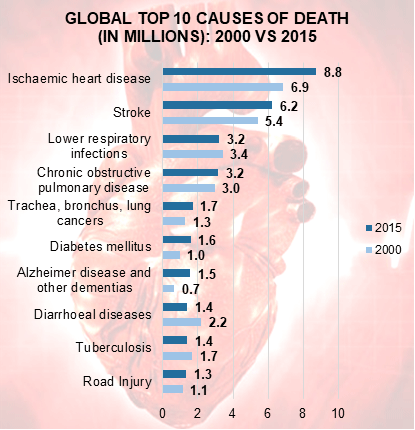
Insight Survey’s latest South African Healthcare Industry Landscape Report 2017 provides a holistic understanding of the healthcare landscape in South Africa based on the latest information and research.
In South Africa, the number of deaths recorded in 2015 totalled 460,236 (compared to over one million births), indicating a 3% decline in deaths processed between 2015 and 2014. The majority of deaths were due to noncommunicable diseases (55.5% in 2015), an increase from 42.9% in 2005. Interestingly, when compared to the global situation, the graph below shows that the leading cause of natural deaths in South Africa in 2015 was tuberculosis (a communicable disease), accounting for 7.2% of all recorded deaths for that year, followed by diabetes mellitus (accounting for 5.4% of deaths) and cerebrovascular diseases (which accounted for 5.0% of deaths) – both of which are noncommunicable diseases.
In South Africa, the vision for health by 2030, according to the National Development Plan, is to achieve a health system that works for everyone and produces positive health outcomes. To achieve this 2030 vision, certain targets have been set, including progressively improving HIV/TB prevention and cure, reducing maternal and child mortality, and reducing prevalence of noncommunicable chronic diseases by 28%. Furthermore, due to the high prevalence of citizens living with HIV and/or TB in the country (7.05 million HIV/AIDS patients in 2016, for example), the National Strategic Plan (2017-2022) on HIV, STI’s and TB includes more specific objectives and goals.
The National Health Insurance (NHI) initiative was finally gazetted on 30 June 2017 and as per the gazette, the NHI is a health financing system that is designed to pool funds together to provide access to quality and affordable health services to all South Africans based on their health needs irrespective of their socio-economic status. The NHI will be implemented through the creation of a single fund that is publicly financed and publicly administered.
Several options are being considered for raising revenue to fund NHI and this funding will also occur through various sources. A large amount of funding will be generated from general taxes to support the NHI fund. Furthermore, all individuals earning above a set amount will be required by law to contribute directly. Employers will also be required to assist the NHI Fund by ensuring that their workers’ NHI contributions are collected and submitted in a manner similar to UIF contributions and employers will be required to match employees’ NHI contributions as well.
Healthcare consumers will be free to continue their medical scheme membership, but they will not be able to opt out from making contributions to the NHI Fund. Furthermore, Government will also no longer provide tax subsidies for medical scheme contributions.
However, the future success of the NHI will be based on achieving collaborative solutions to multiple issues. For example, in June 2017, there were more than 18,700 Medical Practitioners in the private sector versus only 5,325 Practitioners in the public sector and thus a clear necessity is for the NHI to include private medical practitioners through a win-win solution.
The South African Healthcare Industry Landscape Report 2017 (137 pages) provides a dynamic synthesis of industry research, examining South African Population Demographics, Global and SA Burden of Disease, Medical advancements in major chronic diseases, Healthcare Policy (NDP 2030, Strategic Plan 2017-2022, NHI as per government gazette), Healthcare Practitioner Stats, Hospitals and Clinics, Medical Aids, and the Pharmaceutical Services Sector.
Some key questions the report will help you to answer:
- What is the burden of disease faced on a global and local scale?
- Which examples of major chronic diseases are currently prevalent in South Africa, including their characteristics, treatments and medical advancements associated with these diseases?
- What does the SA Healthcare Policy entail, including the Medium-term Strategic Framework 2014-2019, the National Strategic Plan on HIV, STIs and TB, and National Health Insurance?
- What are the latest healthcare practitioner, hospital and clinics stats?
- What are the characteristics of the South African medical aid landscape, including trends and details of medical aid beneficiaries, medical aid schemes, administrators, major company profiles, and benefits paid by medical aids?
- What are the key characteristics of the South African pharmaceutical services?
Please note that the 137-page PowerPoint report is available for purchase for R25,000 (excluding VAT). Alternatively, individual sections can be purchased for R9,000 (excluding VAT). For additional information simply contact us at
az.oc.yevrusthgisni@ofni
or directly on (021) 045-0202 or (010) 140- 5756.
For a full brochure please go to: http://www.insightsurvey.co.za/south-african-healthcare-industry-report
About Insight Survey:
Insight Survey is a South African B2B market research company with more than 10 years of heritage, focusing on business-to business (B2B) market research to ensure smarter, more-profitable business decisions are made with reduced investment risk.
We offer B2B market research solutions to help you to successfully improve or expand your business, enter new markets, launch new products or better understand your internal or external environment.
Our bespoke Competitive Business Intelligence Research can help give you the edge in a global marketplace, empowering your business to overcome industry challenges quickly and effectively, and enabling you to realise your potential and achieve your vision.
From strategic overviews of your business’s competitive environment through to specific competitor profiles, our customised Competitive Intelligence Research is designed to meet your unique needs.
For more information, go to www.insightsurvey.co.za.